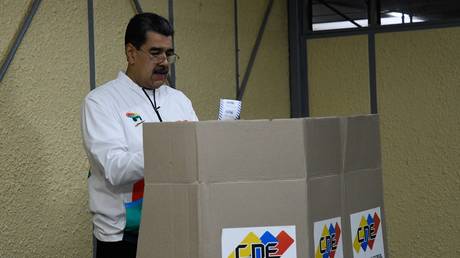
The consultative referendum was held amid a century-old dispute for land and newly discovered offshore hydrocarbons
Voters in Venezuela have overwhelmingly backed their government’s position on a territorial dispute with neighboring Guyana, the country’s National Electoral Council has reported. The row stems from the US border arbitration more than a century ago, which Caracas considers unfair.
The five-question “consultative referendum” held on Sunday was initiated by President Nicolas Maduro after the International Court of Justice (ICJ) ruled in April that it had jurisdiction in the case. The territory in question is known as Esequiba and measures some 159,500 square kilometers (61,600 square miles), or roughly two-thirds of the entire territory of Guyana.
The dispute stems from 19th-century disagreements over where the border between Guyana, then a British colony, and Venezuela should lie. In the 1890s, Washington intervened against London’s interests under the Monroe Doctrine, which ostensibly protected Latin America from European colonial powers.
The UK agreed to a US arbitration, in which a panel of two Americans, two Britons, and a Russian produced a ruling in 1899 that largely favored British territorial claims. Venezuela rejected the outcome at that time.
The issue was revisited during the decolonization period after World War II, as Guyana was about to gain independence. The Geneva Agreement of 1966 proposed a roadmap towards an eventual satisfactory resolution, in which the UN was given a role. In 2018, UN Secretary-General Antonio Guterres referred the case to the court in The Hague.
In the Sunday ballot, Venezuelans rejected the 1899 arbitration and supported the 1966 agreement as the only valid instrument for resolving the situation. They also endorsed the formal creation of ‘Guayana Esequiba’ as a new state in Venezuela, with citizenship to be offered to residents of the Guyana-administered territory.
The fourth question asked voters whether they rejected Guyana’s unilateral attempts to delimit the sea border with Venezuela, to which they also said ‘Yes.’ In the 2010s, ExxonMobil surveyors discovered offshore oil in commercial quantities in the part of the Atlantic to which Esequiba gives access.
On Friday, the ICJ warned Venezuela against trying to change the status quo and of Guyana’s control of Esequiba but did not explicitly prohibit it from holding the referendum. Caracas has rejected the court’s jurisdiction in the case and asked voters whether they agreed with the government’s official stance, which they did.
On the day of the referendum, Guyanese President Mohamed Irfaan Ali said his people had “nothing to fear over the next number of hours, days, months ahead,” and urged Caracas to “show maturity” in handling the dispute.



